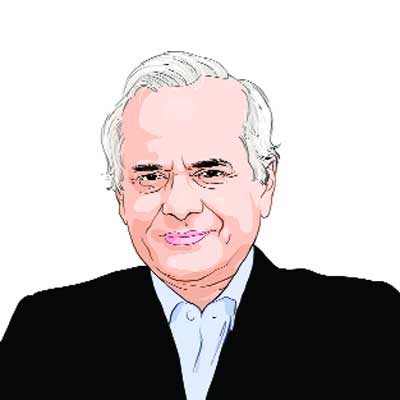Opinion The schizophrenia of success
If games,flyovers and international recognition turn our heads,the India growth story could suffer....
It is sad that the first thought that crosses my mind when I see a flyover under construction is: I wonder how much money has been paid to officials in bribes and commissions, not that once the flyover is completed the traffic congestion will ease,and there will then be benefits for commerce and development.
It bothers me that whenever I am in Delhi and witness to the frenzy of the preparations for the Commonwealth Games (CWG),I think first of the consequences of compromised standards and quality: How long before the stadium,parking lots,houses,etc. built for the games start to develop cracks? This is an unjustified concern,as I do not have any evidence of shortcomings other than the anecdotal evidence provided by journalists and that is not proof enough. Still,I seldom reflect that,once completed,Delhi could be a world-class metropolis,and may provide a platform for an eventual bid for the Olympics the avowed ambition of Suresh Kalmadi.
It troubles me that when I share these thoughts with my bureaucrat or politician friends in informal drawing-room conversations people who,while not directly involved with flyovers or the CWG,have an indirect responsibility by virtue of being in the fraternity of officialdom they do not chide me for cynicism or pessimism. But,on the contrary,they reinforce my views by providing details of the mechanisms by which money changes hands,and by describing how the sinews of our governance system enable the longer-term public interest to be shortchanged for immediate and personal gratification.
Those thoughts juxtapose with the converse,uplifting evidence of our economic development. I travel a great deal and there is no international or national conference at which Indias recent economic performance is not lauded. A decade back the conversation bracketed China and India but then usually moved on to a discussion on China alone. India was recognised for its potential but the not-so-subtle presumption was that its culture,bureaucracy and politics would forever smother the realisation of this potential. China was the only game in town.
Today the reverse is often the case. China remains big game; but more and more senior executives are giving public vent to their frustrations. The CEOs of BASF and Siemens were recently told to calm down by the Chinese PM after they had catalogued the mercantilist and protectionist practices that favour Chinese companies and workers in a speech made in his presence. India on the other hand has ratcheted up the agenda of board discussions. The shenanigans of our political class and the inflexibility of the bureaucracy do get talked about,and corruption is a massive concern but the conversation no longer ends there. It moves on to the dynamics and entrepreneurship of industry; the capabilities of our technocrats; the potential of rural demand and the enduring advantages of a pluralist and transparent society.
On the international front,too,there is public acknowledgement of Indias strength. Obama left the White House to shake hands with our foreign minister the first time apparently he has made such a physically testing gesture. Cameron was here last week with his top cabinet colleagues and 60 other delegates to put flesh around the special relationship that his government had called for,through the medium of the Queens opening speech to Parliament. And there is near unanimity that India should have a permanent seat on the UN Security Council.
My somewhat schizophrenic thought process will not surprise anyone. India has multiple personas,and there must be many with similarly conflicting mindsets. The question that this schizophrenia raises is,however,a concern. To what extent will the arrow of our economic progress get blunted by mindsets such as mine? To what degree will institutionalised corruption and the erosion of public morality impede sustainable development?
I am reminded of an article I read some months back in the Financial Times. The author had lived in Athens in the months before the Athens Olympics. He wrote that there was a general mood of scepticism about those games. Few people had confidence that it would be a success. They talked of the pollution in the city; delays in the construction of facilities; and factionalism within the organising committee. In the end,as everyone knows,the Athens Olympics were a huge success,and the resultant fallout was palpably positive: the Greeks stopped talking about all that was wrong with their society,they recovered their self-confidence,and the economy boomed. Today,less than a decade later,Greece is effectively bankrupt,and Greek officials stand,cap in hand,at the doorsteps of stronger economies in the European Union and the IMF. The author asks: how did such a situation come to pass?
His answer touches on all the now well-known reasons financial profligacy,accounting fudges and poor leadership but he adds one important albeit neglected factor. He writes the Greeks focused only on what had changed. They did not ask the obverse question: what had not changed? Had they done so,they might not have got so carried away by the accolades that they received (and undoubtedly deserved) after the Athens Olympics.
I think there in a lesson in this for us too. We need to ask a similar question,and by doing so,direct the spotlight on the structural malaise that continues to afflict our society. It is not that we should not be proud of our economic success but we must also ponder the longer-term implications of eroded moral leadership. Greece did not fall over the edge overnight. It crumbled slowly but inexorably because the fundamental weaknesses of their society had not been addressed.
The schizophrenia of people like me arises because of the growing worry that the base of our progress may not be that solid: And that economic triumphalism is cloaking underlying problems.
The author is Chairman of the Shell Group in India. The views expressed are personal





